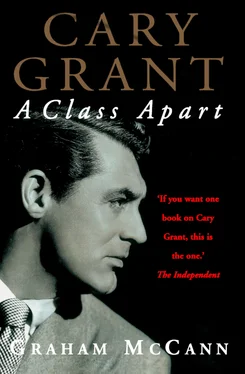Archie Leach was kept ignorant of his father’s other family. He and his father moved in with Elias’s elderly mother, Elizabeth, in Picton Street, Montpelier, nearer to the centre of Bristol. Elias and Archie occupied the front downstairs living-room and a back upstairs bedroom, while Archie’s grandmother (whom he later remembered as ‘a cold, cold woman’ 13 ) kept to herself in a larger upstairs bedroom at the front of the house. This arrangement provided, at least in theory, someone to look after Archie while his father was spending time with his new family, and it saved Elias the expense of renting two separate houses for his double life.
Archie Leach never knew the full extent of the extraordinary deception perpetrated by his father. 14 Cary Grant discovered the truth (or at least a part of it) two decades later, in Hollywood, after the death on 1 December 1935 15 of his father from the effects of alcoholism – or, as the official account put it, ‘extreme toxicity’ 16 – when a lawyer wrote to him from England to inform him that his mother was in fact still alive. 17 Through the London solicitors Davies, Kirby & Karath, Grant arranged for the provision of an allowance and moved her to a house in Bristol. Elsie Leach was fifty-seven years old, her son thirty-two. She barely recognised the tall, well-dressed sun-tanned star who arrived back in England to be reunited with her. ‘She seemed perfectly normal,’ Grant would recall, ‘maybe extra shy. But she wasn’t a raving lunatic.’ 18 As Ernest Kingdon put it, ‘Cary Grant knew very little of his mother. She was a stranger. Late in life, they had to come together and learn to know each other. It was a tragedy, really – a great tragedy.’ 19
Suddenly to re-acquire a mother in one’s early thirties must have been, to say the least, a strange experience, just as the sudden reappearance of an adult son one last saw leaving for school at the age of nine must have been profoundly unsettling. ‘I was known to most people of the world by sight and by name, yet not to my mother,’ 20 Grant would say. He, in turn, would never know how ill she had been. Their subsequent relationship, unsurprisingly, might best be described as ‘difficult’.
Opinions differ as to how difficult the relationship actually was. Any references to mothers in his movies – no matter how slight or frivolously comic – have been pounced upon by some writers for their supposedly deeper ‘significance’: in one, for example, his character – a paediatrician – has written a book entitled What’s Wrong With Mothers . 21 According to his biographers Charles Higham and Roy Moseley, there was never any real warmth or affection shared by mother and son; Elsie, it is claimed, was a ‘hard, unyielding woman’ who never showed much gratitude for her famous son’s regular flights to Bristol, nor did she allow him ‘to make her rich’, and she ‘remained stubbornly independent and uninterested in his film career till the end’. 22 She was not, according to some accounts, a physically demonstrative person, and she could sometimes appear aloof and brusque in the presence of strangers. 23 Dyan Cannon, Grant’s fourth wife, after spending some time with her new mother-in-law, described her as an ‘incredible’ woman with a ‘psyche that has the strength of a twenty-mule team’. 24 Grant himself, after her death in 1973, two weeks short of her ninety-sixth birthday, admitted that he had often been exasperated and sometimes hurt by Elsie’s stubborn and misplaced sense of independence:
Even in her later years, she refused to acknowledge that I was supporting her … One time – it was before it became ecologically improper to do so – I took her some fur coats. I remember she said, ‘What do you want from me now?’ and I said, ‘It’s just because I love you,’ and she said something like, ‘Oh, you …’ She wouldn’t accept it. 25
According to Maureen Donaldson, who lived with Grant for a brief period in the mid-seventies, he said that his mother ‘did not know how to give affection and she did not know how to receive it either’. 26 He is said to have told one interviewer that his mother – in part because of her prolonged absence – had been, until quite late on, ‘a serious negative influence’ on his life. 27 Bea Shaw, a friend of Grant’s, recalls him as being ‘devoted to his mother, but she made him nervous. He said, “When I go to see her, the minute I get to Bristol, I start clearing my throat.”’ 28
It seems, however, that the relationship was not as grim as some have suggested. Speaking in the early 1960s, when his mother was in her eighties, Grant described her as ‘very active, wiry and witty, and extremely good company’. 29 According to some interviewers, Grant remembered visits to his mother when the two would talk and laugh together ‘until tears came into our eyes’. 30 In a letter to the Bristol Evening Post , Leonard V. Blake recalled first seeing Elsie – ‘a rather plainly dressed woman’ – in a department store in the city, telling someone, ‘I have heard from Archie.’ Blake went on to observe that she ‘would visibly glow as his name was mentioned … I believe she would wander around Bristol just waiting to talk about Archie. He was the Sun to her.’ 31 Clarice Earl, who was a matron at Chesterfield Nursing Home in Bristol, where Elsie lived during her last few years, describes how when Elsie knew that her son was due to visit she would dress herself up and become excited: ‘She would sit by my office and look along the corridor toward the front door. When she saw him, she’d give a little skip and throw up her arms to greet him.’ 32 Years earlier, when the strangeness of her son’s celebrity was far fresher in her mind, she still showed much more interest in him and his career than has usually been suggested. Writing to him at the end of 1938, for example, she confessed: ‘I felt ever so confused after so many years you have grown such a man. I am more than delighted you have done so well. I trust in God you will keep well and strong.’ 33 After the end of the Second World War, when Elsie was almost seventy years old, she was interviewed by a Bristol newspaper about her son: ‘It’s been a long time since I have seen him,’ she said, ‘but he writes regularly and I see all his films. But I wish he would settle down and raise a family. That would be a great relief for me.’ 34
Elsie Leach, it is true, did not accept her son’s offer – which was put to her on more than one occasion – to move to California, but her refusal was prompted by reasons other than any alleged ill-feelings towards her son. At the end of his life, Grant explained:
She wouldn’t join me in America. She told me: ‘Never lived anywhere but Bristol. Don’t want to [leave], only place I know.’ At her own request she lived in a nursing home but we kept her house although we knew she would never return there. I didn’t want to get rid of it. It would have seemed like I was packing her off. 35
Elsie was, it seems, as concerned about her son as he was about her. In 1942, when war prevented him from flying over to see her, she wrote to him: ‘Darling, if you don’t come over as soon as the war ends, I shall come over to you … We are so many thousands of miles from each other.’ 36 A friend of Elsie’s recalled seeing two large chests of food which had been gifts from Grant. When she was asked why they remained unopened, Elsie is said to have replied, ‘I want to have them until they’re really needed … You never know … Cary might be hard up one day.’ 37 When Grant tried, unsuccessfully, to persuade her to let him hire someone to do her housework for her, he was amused and impressed rather than upset by her negative response: ‘she avers that she can do it better herself, dear, that she doesn’t want anyone around telling her what to do or getting in her way, dear, and that the very fact of the occupation keeps her going, you see, dear’. 38
Читать дальше












